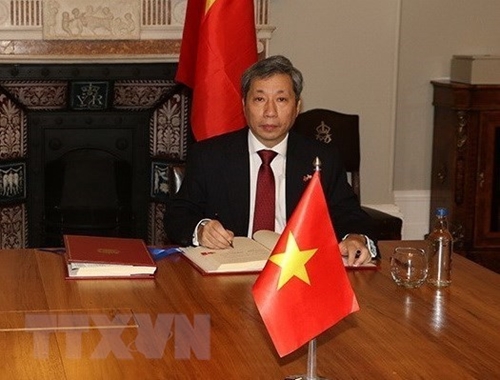The pact was signed by the two countries in London on December 29 evening (Vietnamese time), following the conclusion of negotiations on December 11.
This is a historic event that plays an important role in the bilateral ties, Vietnamese Ambassador to the UK Tran Ngoc An affirmed during an interview with the Vietnam News Agency (VNA).
As a new-generation, high-quality deal, UKVFTA aims to completely eliminate import taxes as well as non-tariff barriers on goods from the two countries under a short roadmap, he said.
It also contains important provisions on intellectual property rights, investment liberalization, and sustainable development, according to the ambassador.
    |
 |
|
Vietnamese Ambassador to the UK Tran Ngoc An |
The pact is intended to ensure that there will be no interruption to the Vietnam-UK trade because of Brexit, the ambassador said, adding that the deal, to be put into place in early 2021 right after the transitional period of the UK’s Brexit expires on December 31, will facilitate the smooth flow of goods between the two countries, especially necessities amidst the complex development of COVID-19.
He added that UKVFTA will help boost the volume of goods from both sides entering the other’s market.
Over the past years, especially since the establishment of the strategic partnership in 2010, trade between Vietnam and the UK has enjoyed double-digit increases, from USD 2 billion to USD 6.6 billion in 2019, with Vietnam’s exports USD 5.7 billion.
In the first 11 months of this year, despite the adverse impact of Brexit and COVID-19, the two-way trade stilled reached some USD 5.2 billion.
Only two days after the signing of the agreement, more than 70 percent of Vietnamese exports and 65 percent of goods from the UK will enjoy tax reductions, with many subject to a zero percent tariff.
After six years, the zero percent tariff will be levied on more than 99 percent of goods traded between the two countries, the ambassador said.
According to An, Vietnam’s exports such as electronics, garments-textiles, footwear, agricultural products like rice, coffee and rubber, seafood, and timber and ceramic products, and the UK’s medicine, machinery, equipment, chemicals, auto, banking and insurance would benefit much from the deal.
He, therefore, suggested UK firms to engage in pharmaceutical distribution in the Southeast Asian nation.
The ambassador called attention to a fact that although Vietnam’s exports to the UK rose sharply over the past decade, the export revenue made up less than 1 percent of the UK’s import value.
“There are still substantial potential and opportunities for Vietnamese goods to penetrate the UK if Vietnam knows how to optimize the trade deal,” he said, suggesting local firms strive to meet high-quality requirements regarding quality, packaging, hygiene and environment.
With its openness, the UK market has been regarded as a playground of many countries, which requires competitive prices of Vietnamese goods, he said. “Vietnamese businesses need to further improve product quality and reduce prices, while stepping up marketing and product promotion.”
Notably, “trust” is the prerequisite for Vietnamese goods to gain a firm foothold in the UK market, he stressed.
UKVFTA is a step forward of the UK towards becoming a dialogue partner of ASEAN and a member of the Comprehensive and Progressive Agreement for Trans-Pacific Partnership (CPTPP) in a near future as Vietnam is a constructive member of ASEAN and a founding member of CPTPP.
With a population of nearly 100 million, Vietnam has set up links with 60 economies worldwide through 15 FTA, both bilateral and multilateral, the ambassador elaborated.
Moreover, the trade deal would trigger a new wave of direct and indirect investments from the UK, particularly in renewable energy and environmental technology that are of the country’s strength, An noted.
Source: VNA